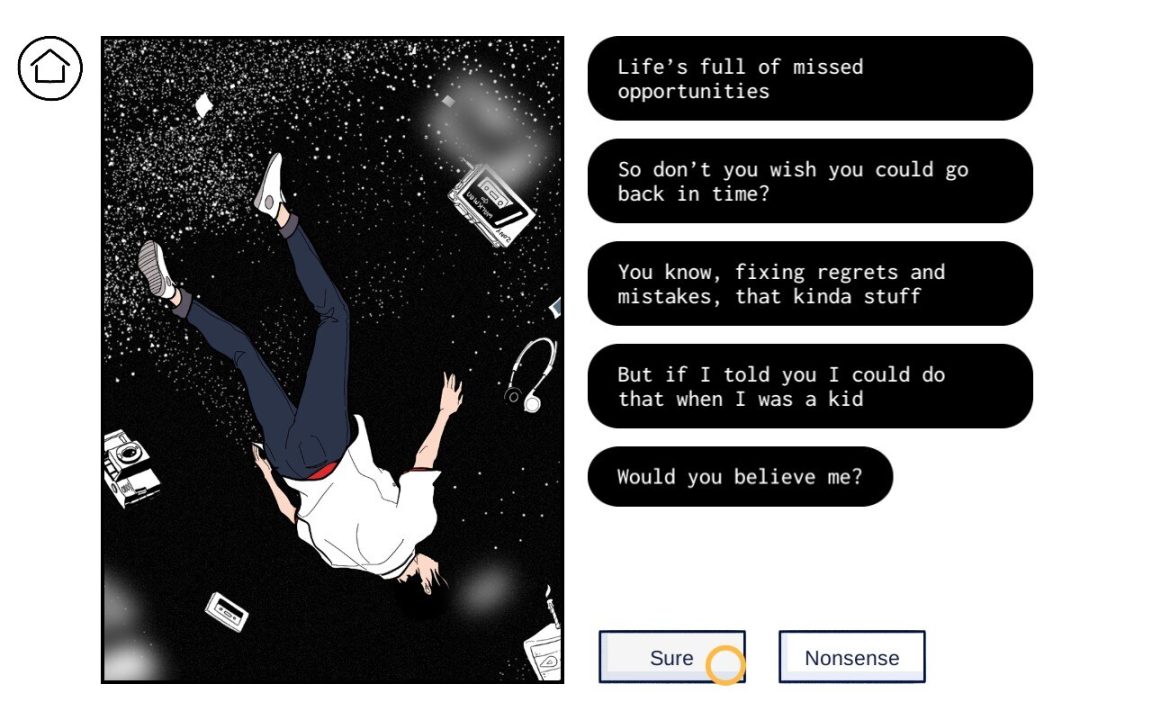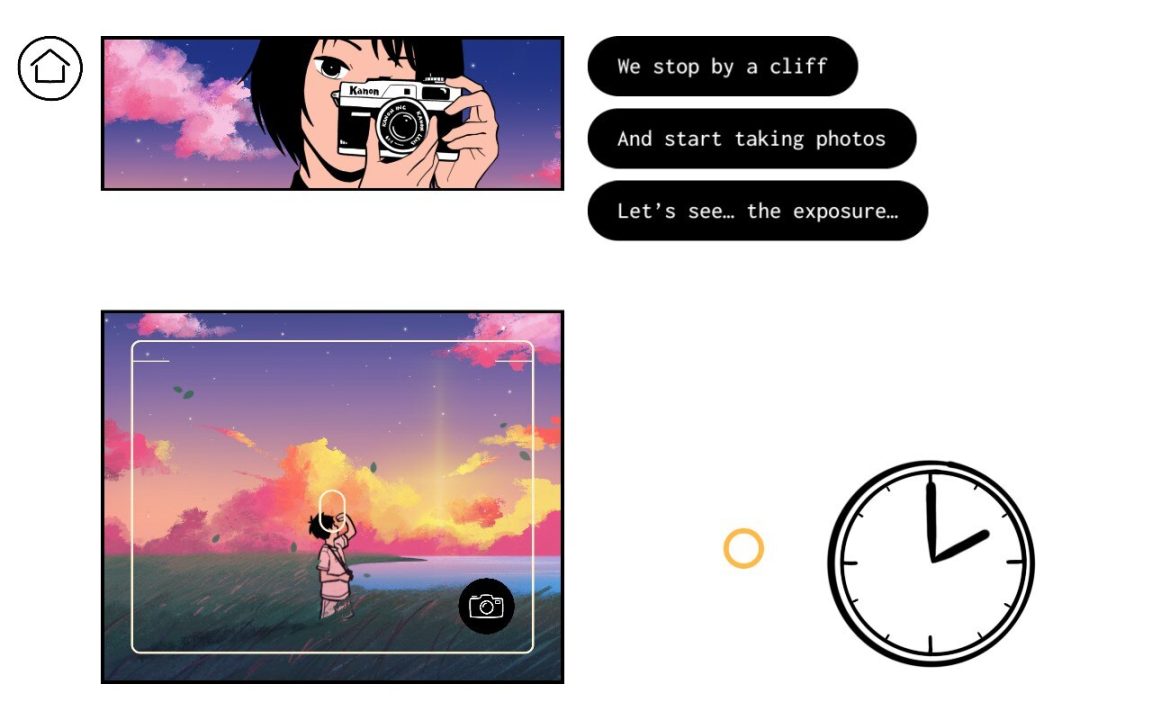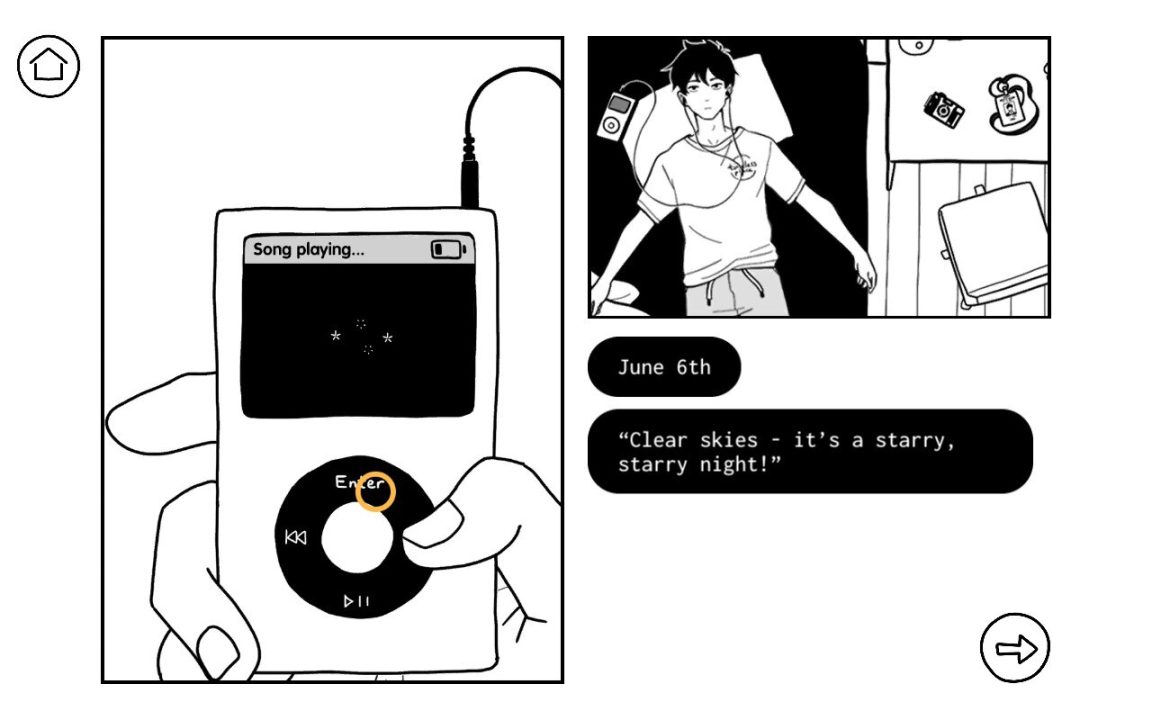Goodbyes can be painfully heartbreaking, but they’re also a quiet, reflective celebration of moments well-lived: a softly gentle way to illustrate the invisible bonds surrounding us. Malaysian-based indie developer RB Wolf Design’s visual novel Once Again is a gorgeously moving story about cherishing such goodbyes whenever they occur. Moreover, the game creatively conveys its message throughout its briefly poignant playtime.
The VN begins with a young man named Sia explaining an extraordinary aspect of his life. Since he was a small child, Sia somehow mysteriously travels back in time for a single day during his birthday on June 6th. While there, his path crosses with that of a young photographer with whom he shares a connection. For several birthdays following his initial time travel experience, Sia spends a summer day with the mysterious woman. By doing so, he discovers more about her and her role in his own life through their interactions and begins to discern the directions he may want to travel on his own. It’s a tale of bonds and self-discovery, buoyed between the past and present like a small toy boat in a gently flowing creek.
Once Again is a fascinating type of VN in that there’s only one set path and one outcome. Yet, I’m hard-pressed to describe it as a true kinetic VN because there’s a surprising amount of player interactivity that breaks up the storytelling and propels it forward. You first watch as dialogue and plot points appear in text bubbles on the screen, accompanied by some truly gorgeous art. Then you’re given an action to complete to advance the story further. These actions can be simple things like scrubbing your finger along a notebook picture to reveal what writing is there or moving a door to the side to see what is happening behind it. Sometimes you choose a flavor of popsicle or what action you’ll take in a game of rock-paper-scissors. Other times, you take photos of things spied in the game, even adjusting the focus and exposure settings to do so correctly. There are no absolute “failure” outcomes for these actions; instead, they’re serving as guideposts to gently take you by the hand to reveal the next story beat to you. They’re pleasant ways to break up the monotony of text scrolling without ever breaking the immersion of the tale itself.

Once Again has a core message it wishes to convey and doesn’t deviate from it. Instead, the game offers incentives to keep you going along. It’s gentle, relaxing gameplay that settles over the storytelling as gracefully as the narrative itself. Those who want a VN to offer the chance to see how their choices or actions might lead to different branching points might not care for the approach. However, the interactive elements are still a nice touch, and the plot itself is strong enough that the title holds its own.
Weng Hong Yee wrote the story for Once Again, and it’s the game’s primary driving force. Sia’s time-traveling tale is engaging, and you feel for his character and the woman he encounters throughout the various summers it encompasses. The game’s ending alone is worth playing through Once Again, as are the touching and ultimately loving messages the narrative manages to convey. In addition, the English localization is well-done in communicating the VN’s overall emotions and themes, although it’s not completely free of punctuation and mechanical errors.
Visually, Once Again is a rather unique and gorgeous VN. I adore the use of text bubbles and how the art gets broken into comic or manga-style panels with the present timeline in black and white while past portions are vibrant. Bursts of color revealed through touching an image when Sia first travels to the past are also a rather creative and artistic approach to the game’s visual presentation. The artists who worked on Once Again are Hua Chai, Tyris Low, and Vera Tiong. All three masterfully portray the various feelings embedded in the plot through their beautiful work.

The game’s music is composed by Weifan Chang, who serves as Once Again‘s composer and arranger alongside Aruto Matsumoto. The soundtrack captures soothing and tranquil notes, underscoring the tale perfectly and helping to immerse you further into the storytelling experience. The sound effects are subtle and used ideally throughout the title. The game encourages headphones while playing for a completely immersive experience, and I can understand why given the emotive soundscape! You can even purchase the soundtrack, which also has songs featuring the work of Mariko Muranaka and Saki Hayashi, if you’re so inclined. There is also one voice-acted monologue towards the end of Once Again that is very powerful and incredibly performed by Cheer Chen. A gameplay trailer for the game shows its visuals and soundscapes quite accurately.
Overall, Once Again works admirably as a VN in its mechanics and narrative structure. Again, those who like to see branching points in their VNs might be disappointed at their absence here, but the game’s interactive elements and the storyline are compelling enough that that’s not much of a hindrance. The game is short, as my playthrough clocked in at 107 minutes. As a result, it doesn’t give you any save options. Instead, you unlock story chapters as you reach them. The player can access the unlocked chapters in the game’s main menu, and you can choose to replay any that you’d like once they’re available. Given the overall game’s length, compartmentalizing the chapters instead of offering auto-saves or a manual save option is less of an issue than it would be in a game with a lengthier runtime. In addition, Once Again tells a more straightforward narrative centered around a smaller cast, so the shorter playtime makes it feel more affectingly direct. Finally, there needs to be more in the way of replayability with the title setup. You’ll play it once through its entirety, but that will likely be about it.

I did play Once Again on a Steam Deck with touchscreen capabilities, as I found them to be a tremendous boon with the game’s controls. Of course, some actions take a few more minutes to understand what to do with the touchscreen, but overall the touchscreen utilization is woven into the game well. Given its setup, I’m still determining how well Once Again would play on a PC, particularly one without touchscreen capabilities, but it does seem to take to a Steam Deck rather well.
Once Again is a tender and ultimately moving VN about living life to the best of your ability while being able to cherish goodbyes, even if they’re still painful and sad. It’s a beautiful message, and I love the artistic way the title conveys it. Once Again might not be a gaming experience everyone will enjoy, but those it does resonate with will experience an emotional unfolding of a heartfelt story.


